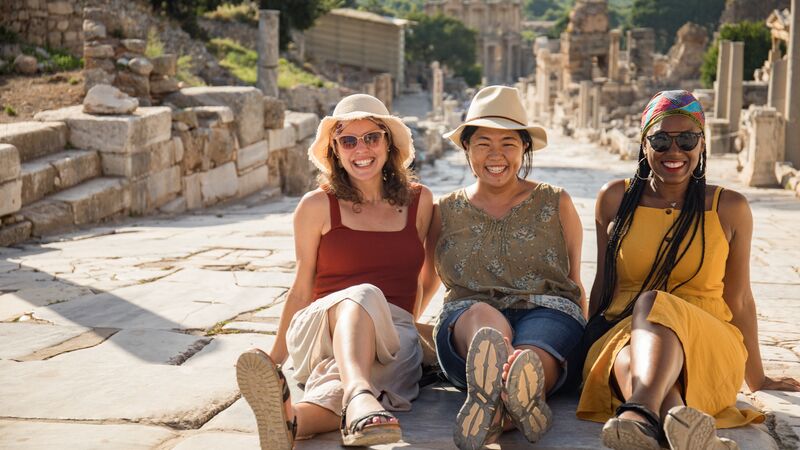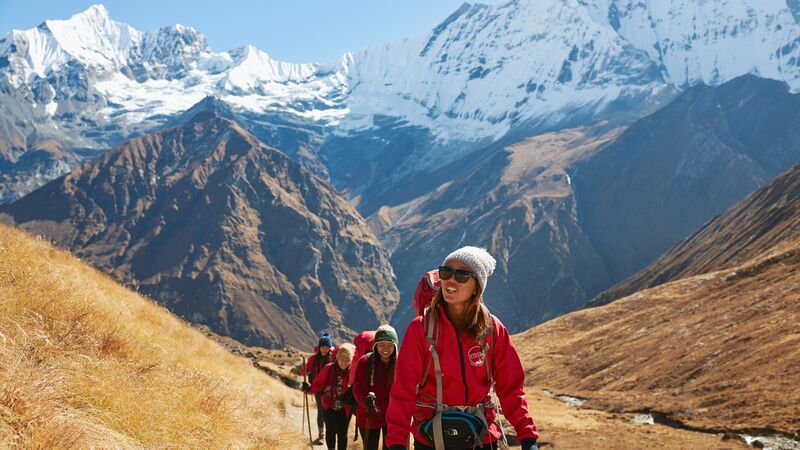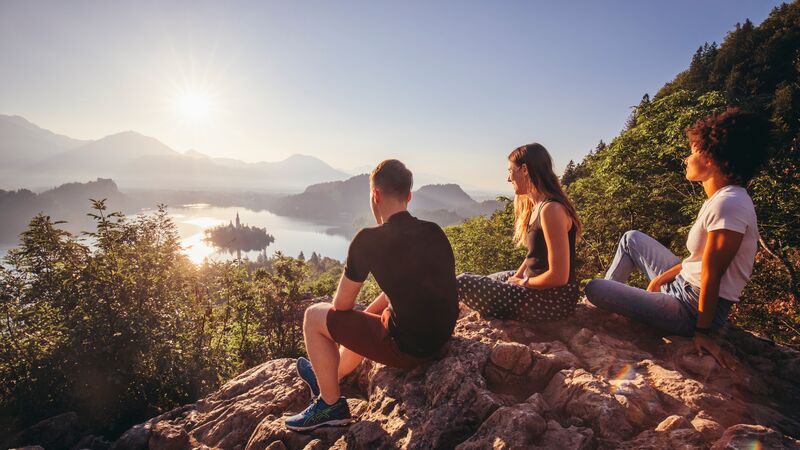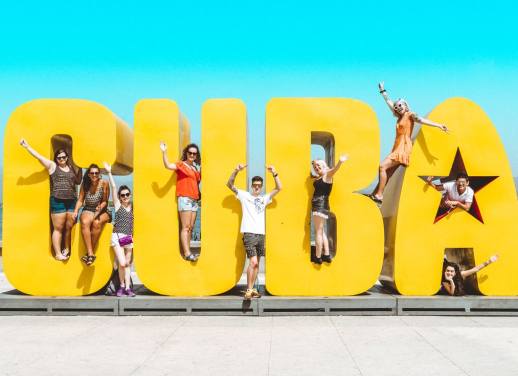This article originally appeared on Adventure.com and has been republished with permission.
Look, this whole coronavirus thing is making us a bit tired and anxious, and we’re sure you’re feeling the same. Ultimately, we’re not sure what’s going to happen over the coming months. Most of us will be OK, but that doesn’t mean it won’t be stressful and difficult. Here, we’ve collated some advice and information for anyone who has travel planned, or might be planning on travelling, over the next few months.
By now, you likely know the gist of coronavirus: It is going to continue to spread around the world (we’re just not sure how widely), 80-90 per cent of cases will be mild (many even asymptomatic), children appear to be spared from the disease, and most at risk are the elderly and those with underlying health conditions.
At time of writing, we’ve had over 90,000 cases of the novel coronavirus (or COVID-19) worldwide and a little over 3,000 deaths. For the majority of people reading this, the statistics are still very much in your favor – even if you contract the disease.
You also likely know how best to protect yourself: Regularly wash your hands (properly) and/or use hand sanitizer, don’t touch your face, cough into your elbow, generally practise good and respectful personal hygiene, try not to lick anyone who looks sick, do not lick anyone if you are sick. You know – that kind of thing.
That advice is all well and good for going about your daily life – but what if you have some form of travel booked, or even just had plans to travel in 2020? What if you’ve already dropped a couple of thousand bucks on flights and accommodation, or are weighing up whether or not to do just that? What then?
Should I cancel my travel plans because of coronavirus?

Photo by Liam Neal.
The short answer, at time of writing, is no, probably not. The World Health Organization (WHO), states that unless you are in a region where coronavirus is spreading, or have travelled to/from an area where it is spreading, or have been in contact with an infected person, your risk of infection remains low.
The longer answer depends on who you are, where you’re going, when you’re going and how you’re going. “I, personally, am still planning to go to Europe in 10 days’ time,” Professor Robert Booy, an expert in infectious diseases from the University of Sydney tells Adventure.com. “I feel the risk [in Europe] for someone aged under 60 is not too high, if you’re going to countries other than Italy, which has the highest rate in Europe at the moment.”
Professor Booy explains that your personal state should help inform any decision to travel. That means your age, whether you have a chronic medical illness, and whether you are likely to be mixing in crowds and countries that have known high transmission rates.
At time of writing, the US Department of State has issued Level 4 (‘Do Not Travel’) warnings to Iran and China, Level 3 (‘Reconsider Travel’) warnings to South Korea and Italy, and a Level 2 (‘Exercise Increased Caution’) warning for Japan. The Australian government has just announced that anyone who has returned from Iran since 19 February must self-isolate.
Wherever you’re based, it’s worth checking your government travel advisory for the latest travel advice before planning anything. And if you have something booked, your first move should be to call your airline, tour company and insurance company to seek their counsel, then square that with your own research.
If I do plan on traveling in the next few months, what should I be wary of?
As of February 29th, WHO is still advising against the application of travel or trade restrictions to countries experiencing coronavirus flare-ups. This isn’t so much about ensuring the rights of travellers to take vacations, but rather because restricting movement of people and goods during these types of emergencies is “ineffective in most situations”, and can wind up harming local economies and industry.
There are other practical reasons to consider where you travel, and the precautions (and insurances) you take before you travel. “Even if you’re under 40, 90 per cent of cases would be mild, but you could still fall moderately unwell – and then you’re at the mercy of the local primary care and hospital services,” says Professor Booy.
It’s not just about you getting sick, either. Even if you did journey overseas, contracted the virus and only experienced mild or even no symptoms, you can still pass it on to others, who may suffer more dramatic or life-threatening symptoms. As such, Professor Booy says there needs to be a focus on everyone protecting the vulnerable – not just the vulnerable protecting themselves. “Just use your common sense, for goodness sake – don’t go and visit anyone who might catch something from you. Doesn’t matter if it’s coronavirus, or influenza, or any other respiratory virus.”
If you do fall ill (with flu-like symptoms) upon returning home from any destination, call your doctor ASAP and be prepared to self-isolate for up to 14 days.
Can I get a refund if I cancel my travel plans because of coronavirus?

Photo by Matt Cherubino.
It depends on what you booked and who you booked with. Hotels often have lenient cancellation policies as long as you’re canceling with more than 24-48 hours’ notice, whereas flights and tour packages – unless booked to one of the five major outbreak areas – might be harder to secure refunds for (depending on when you booked and the latest travel warnings/advice).
Some airlines, such as United, are beginning to waive ticket change fees for new bookings, while the likes of Intrepid Travel (Adventure.com’s parent company) has revised its booking conditions and cancellation policy to make it easier for customers to change their plans.If you want to cancel your trip because you are worried you might catch coronavirus, you might be covered by insurance as long as you booked before January 30th, which is when WHO declared this coronavirus as a global health emergency. You also might not be.
Many insurance companies are now offering travellers the option of a Cancel-For-Any-Reason (CFAR) policy add-on. This means, basically, that you can cancel your trip for any reason – coronavirus, the heebie-jeebies, anything – and be covered for it (or a large percentage of it). If you’re planning a trip later in the year and are yet to book, CFAR will certainly offer some peace of mind.
For pre-existing bookings, you best option is to contact whomever you booked your travel with and ask. Some companies have been showing more leniency over the past few days and weeks – for example, offering full or partial refunds or rescheduling trips for no extra cost at a later date – and it’s likely that travel companies will be forced to establish some kind of policy to deal with the situation in the coming days or weeks.
For a lot of these organisations, it will be in their best interests to maintain a good relationship with their customers, since they’ll need to count on them coming back once we’re through the worst of this.
What will travel look like for the next few months?

Photo by Pat O’Neill.
Within the travel industry, there are very few businesses – save for insurance companies, who tend to do well in times like this – that will get out unscathed. That’s as true for wealthy airlines, hotel chains and global travel companies as it is for the local family businesses that rely on tourism for their income.
It’s worth keeping that in mind when you’re deciding what to do about your trip. While you certainly shouldn’t do anything out of a feeling of guilt, any trips you do take over the next few months will have a tangible positive impact on local businesses and vendors.
If you decide to go overseas, great. You’ll probably be fine, and you’ll probably have a very nice time. If not, travelling more locally, in your own country, is one way to make sure you still spread some of your much-needed tourist dollars around.
There will be heavy discounts around the world on everything from flights, tour packages and accommodation to keep an eye on too. Some hotels in Cairns and the Gold Coast in Australia, for example, who rely heavily on tourists from China, South Korea and Japan, are offering rooms at half-price, and there have been some very reasonable airfares pop up over the last couple of weeks too.
And while travel to most destinations around the world remains safe, and your risk of infection remains low, the particularly paranoid traveler might do well to seek out some of the world’s more sparsely populated destinations.
5 key points to keep in mind for travel in the midst of coronavirus:
1. Consider your personal situation before you travel anywhere: Your age, your physical condition, and medical history. If you’re young and fit, the majority of the world is still very much open to you. If you are older and have asthma, or are otherwise already compromised, maybe don’t go to Iran or Italy. Use your common sense.
2. Practise good hygiene at home and abroad. It’s as much about keeping others safe as it is keeping yourself safe. Even if you contract coronavirus, you can still prevent it spreading by following the advice. Again, common sense.
3. If you have something booked but are genuinely feeling anxious about it, you can try and reschedule the trip for later in the year, or next year, when things may have settled. Chances are you’d be fine, but if you think you’ll be worrying too much to enjoy your trip, it’ll be a waste of money, more than anything. Rebooking, instead of canceling, means the businesses you’re using know that you’ll be coming back, and can plan for it.
4. Check with your airlines and travel and insurance companies for their latest advice before making a decision. Weigh it all up yourself, and make a decision that you, first and foremost, feel comfortable with.
5. Get all of your information from the relevant government/official channels, and know that eventually, this whole thing will pass.
——————
A note from the editors:
Even if you haven’t been directly affected by coronavirus (as most of us haven’t), no one would blame you for feeling exhausted and anxious in the midst of all this. Our 24-hour news cycle, the sheer accessibility of it, and the media’s clicks-at-all-costs mentality mean we don’t just carry the world’s problems in our pockets – we feel the burden of those problems more profoundly, too.
As such, we feel a responsibility to share a few thoughts on this very global, difficult and complicated issue:
– Please be kind to yourselves during this strange time. Limit your exposure to screens and 24-hour news cycles, spend time with the people and things that make you feel good.
– Now is a time for unity, community and togetherness, not fear mongering and sensationalism.
– Go outside, please.
For more information on coronavirus, and how it might affect your travel plans, check our Customer Information Hub here.




